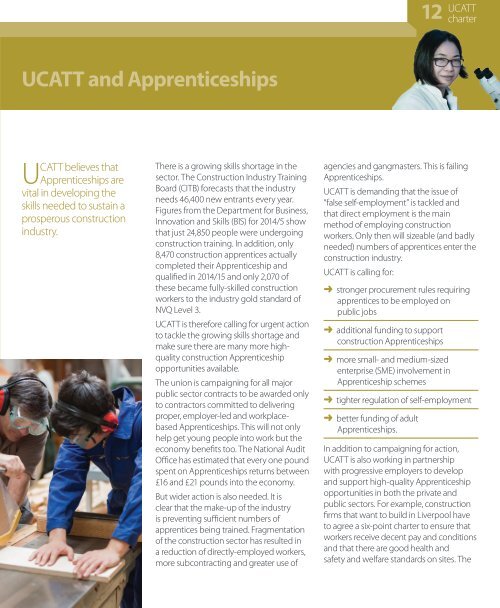TUC Apprenticeships pack inserts (7a)
Create successful ePaper yourself
Turn your PDF publications into a flip-book with our unique Google optimized e-Paper software.
12<br />
UCATT<br />
charter<br />
UCATT and <strong>Apprenticeships</strong><br />
U<br />
CATT believes that<br />
<strong>Apprenticeships</strong> are<br />
vital in developing the<br />
skills needed to sustain a<br />
prosperous construction<br />
industry.<br />
There is a growing skills shortage in the<br />
sector. The Construction Industry Training<br />
Board (CITB) forecasts that the industry<br />
needs 46,400 new entrants every year.<br />
Figures from the Department for Business,<br />
Innovation and Skills (BIS) for 2014/5 show<br />
that just 24,850 people were undergoing<br />
construction training. In addition, only<br />
8,470 construction apprentices actually<br />
completed their Apprenticeship and<br />
qualified in 2014/15 and only 2,070 of<br />
these became fully-skilled construction<br />
workers to the industry gold standard of<br />
NVQ Level 3.<br />
UCATT is therefore calling for urgent action<br />
to tackle the growing skills shortage and<br />
make sure there are many more highquality<br />
construction Apprenticeship<br />
opportunities available.<br />
The union is campaigning for all major<br />
public sector contracts to be awarded only<br />
to contractors committed to delivering<br />
proper, employer-led and workplacebased<br />
<strong>Apprenticeships</strong>. This will not only<br />
help get young people into work but the<br />
economy benefits too. The National Audit<br />
Office has estimated that every one pound<br />
spent on <strong>Apprenticeships</strong> returns between<br />
£16 and £21 pounds into the economy.<br />
But wider action is also needed. It is<br />
clear that the make-up of the industry<br />
is preventing sufficient numbers of<br />
apprentices being trained. Fragmentation<br />
of the construction sector has resulted in<br />
a reduction of directly-employed workers,<br />
more subcontracting and greater use of<br />
agencies and gangmasters. This is failing<br />
<strong>Apprenticeships</strong>.<br />
UCATT is demanding that the issue of<br />
“false self-employment” is tackled and<br />
that direct employment is the main<br />
method of employing construction<br />
workers. Only then will sizeable (and badly<br />
needed) numbers of apprentices enter the<br />
construction industry.<br />
UCATT is calling for:<br />
➜➜<br />
stronger procurement rules requiring<br />
apprentices to be employed on<br />
public jobs<br />
➜➜<br />
additional funding to support<br />
construction <strong>Apprenticeships</strong><br />
➜➜<br />
more small- and medium-sized<br />
enterprise (SME) involvement in<br />
Apprenticeship schemes<br />
➜➜<br />
tighter regulation of self-employment<br />
➜➜<br />
better funding of adult<br />
<strong>Apprenticeships</strong>.<br />
In addition to campaigning for action,<br />
UCATT is also working in partnership<br />
with progressive employers to develop<br />
and support high-quality Apprenticeship<br />
opportunities in both the private and<br />
public sectors. For example, construction<br />
firms that want to build in Liverpool have<br />
to agree a six-point charter to ensure that<br />
workers receive decent pay and conditions<br />
and that there are good health and<br />
safety and welfare standards on sites. The


